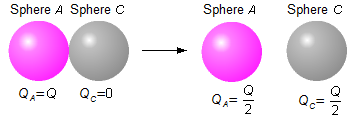We have three identical metallic spheres insulated from each other. Two of them, A and B, are charged with charges equal to Q, and the third, C, is electrically neutral. The sphere C is brought into contact with A and then, C with B. Determine, in these conditions, the electric charge of C.
Problem data:
- Sphere A charge:: Qa = Q;
- Sphere B charge:: Qb = Q;
- Sphere C charge: Qc = 0.
Solution:
Initially, we have the following situation

When we bring spheres A and C into contact, the total charge will be distributed equally across the spheres, and the final charge on each sphere will be the average of the electric charges on the spheres initially

Placing spheres B and C, in contact, the charges of the two spheres will be equally distributed over them, but now the initial charge of C will be the value calculated above \( \frac{Q}{2} \)

The final charge of C will be

Fisicaexe - Physics Solved Problems by Elcio Brandani Mondadori is licensed under a Creative Commons Attribution-NonCommercial-ShareAlike 4.0 International License .